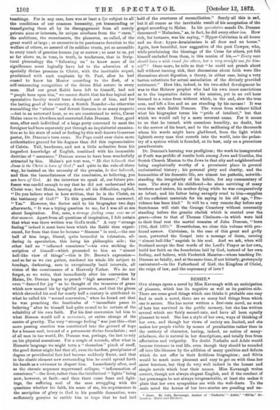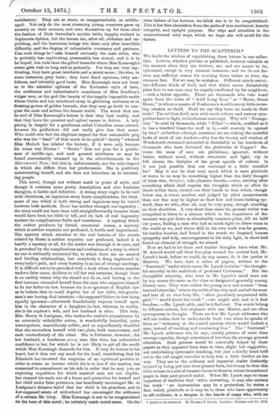BESSIE.* ONE always opens a novel by Miss Kavanagh with
an anticipation of pleasure, which has its negative as well as its positive side. There are some good things which one thinks it probable one may find in such a novel, there are so many bad things from which one is secure. She has never written a first-rate novel, no work of hers has survived in the public memory, but she has written several which are 'fairly second-rate, and have all been equally pleasant to read. She has a style of her own, ways of thinking of her own, and though her views of society are limited, and she makes her people visible by means of peculiarities rather than in the entirety of character, having, indeed, no notion of many- sidedness, she is natural in her descriptions, and totally free from affectation and vulgarity. No doubt Nathalie and Adele would become tiresome in real life, even though they should be rounded off into life-likeness by the addition of many qualities and defects which do not offer in their fictitious biographies ; and Silvia would be much more pleasant and easy to get on with than ler sister heroines, but they do very well indeed in the honest and simple novels which bear their names. Miss Kavanagh writes correct, though not always elegant English, and if the conduct of her personages be not always irreproachable, at least she makes it plain that her own sympathies are with the well-doers. To the male mind the heroes of her love-stories are puzzling and un-
• Basle. By Julia Kavanagh, Author of "Nethalie," Adele," "thtirle," dos. London: Hunt and Blackett. satisfactory. They are so stern, so unapproachable, so middle- aged. Not only do the most charming young creatures grow up entirely. on their account, and save themselves up for them after the-fashion of Dick Swiveller's, mythic bride; happily realised in Sophronia-Sphinx, but the heroes are, after all; obdurate and un- yielding, and the beauteous beings win them only. after incredible. difficulty, and the display of indomitable constancy and patience. Can such things be ? asks himself enviously the male critic, who is probably leas- captivating, presumably less stoical, and it is to be hoped, less rude than the gifted bears for whom Miss Kavanagh's sweet girds wait so long and so patiently. For they are very cap- tivating, they have great intellects and amoral-sense; likewise, in. some instances, grey hairs ; they have fixed opinions, lofty am- bitions, and tolerably good looks, Miss Kavanagh does- not treat us to the adorable ugliness of the Rochester- style of hero, the stableman and haberdasher's comeliness of Miss Braddon's vulgar men, or the god-like beauty of the happily impossible snobs whom Oujda and her sisterhood array in glittering uniforms or in dressing-gowns of golden brocade, that they-may go forth to- con- quer the male and seduce the female world. The worst that can be said of Miss Kavanagh's heroes is that they lack reality, and. that they have the queerest and ugliest names in fiction. A lady pining in despair for a gentleman called Cornelius seems absurd, because his godfathers did not really give him that name. Who could ever feel the slightest respect for that unbearable prig who was the "head" of that much to-be-pitied." family" whereof Miss Muloch has related the history, if it were only because his name was Ninian ? " Bessie " does not pine for a gentle- man of middle-age, and such general attributes as may be found conveniently summed up in the advertisements in the Matrimonial News ; but this is, unfortunately, not the only respect in which she differs from her predecessors. She is positively uninteresting herself, and she does not introduce us to interest- ing people.
This novel, though not without merit in point of style, and though it contains some pretty descriptions and nice feminine thoughts, is feeble and defective. A strong story ought to be told with directness, an ingenious story bears complications, the treat- ment of one which is both strong and ingenious may be varied between both methods. Bessie has neither strength nor ingenuity ; the story could not have been told straightforwardly because there would have been too little to tell, and its lack of real ingenuity renders its complications futile and wearisome. A mystery which the author produces by forced, unnatural means, a mystery which is neither requisite nor profound, is feeble and impertinent. The mystery which attaches to the real heroine of the events related by Bessie is neither requisite nor profound, indeed it is hardly a mystery at all, for the reader sees through it at once, and is provoked'by the complications and confusions of a story in which no one is rationally accounted for, in which there are no assured and binding relationships, but everybody is flung haphazard in everybody's path, and every hostelry is an inn of strange meetings. It is difficult not to be provoked with a book whose heroine marries tinder a false name, declines to tell her real surname, though there is no earthly reason why she should not do so, and having in the first instance concealed herself from the man who supposes himself to be her father-in-law, because she is so ignorant of English law as to believe that he could deprive her of her child, this gentle- man's son having died intestate—the supposed father-in-law being equally ignorant—afterwards fraudulently imposes herself upon him- in the character of a daughter-in-law, whereas, in reality, she is his nephew's wife, and her husband is alive. This lady, Mrs. Henry de Lueignan, who makes the reader's acquaintance by an extremely unladylike action, is wonderfully beautiful, quite unscrupulous, marvellously selfish, and so superfluously deceitful that she encumbers herself with two plots, both unnecessary, and each contradictory of- the other. She is fortunate, however ; for her husband, a handsome young man this- time, has unbounded confidence in her, for which he is not likely to get all the credit which Miss Kavanagh demands for him. It may do honour to his heart, but it does not say much for his head, considering that his Elizabeth has incurred the suspicion of an equivocal position in order to retain an income which she is to lose if she marries, has consented to concealment on his side in order that he may join an exploring expedition for which married men are not eligible, has cheated his uncle out of-a home and protection for herself and her child under false pretences, has heartlessly encouraged Mr. de Lusignan's delusive belief that her child is his grandson, and in her supposedlettate of widowhood has encouraged the addresses of a certain-Mr. Grey. Miss Kavanagh is not to be congratulated on the hero of this novel ; he certainly needs moral sense. On the
utter failure of her heroine, we-think she is to be congratulated. This is her first aberration from the paths of true sentiment, homely integrity, and upright purpose. She trips and stumbles in the unaccustomed miry ways, which we hope she will avoid for the future.



































 Previous page
Previous page